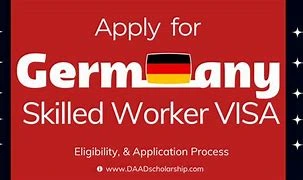Germany is grappling with a significant labor shortage, requiring at least 400,000 skilled workers every year to meet the demands of its growing economy. To tackle this crisis and attract international talent, Germany is streamlining its immigration processes. In 2025, skilled workers will find German work visa pathways easier to navigate, thanks to new reforms aimed at simplifying visa applications and creating more opportunities in in-demand sectors.
In this article, we’ll explore the most in-demand professions in Germany, the work visa pathways available, and how these new policies will help skilled workers pursue rewarding careers in Germany.
In-Demand Professions in Germany
Germany’s economic success relies heavily on skilled labor, and the country faces a growing need for professionals in key industries. According to a recent report from the European Labour Authority (ELA), more than 70 professions are currently experiencing significant labor shortages. The most urgent sectors requiring foreign talent include:
1. Healthcare & Medical Professions
Germany’s healthcare system is under pressure, creating substantial demand for medical professionals. Some of the most sought-after healthcare roles are:
- Nursing professionals
- Medical technicians
- Physiotherapists
- Dental assistants
2. Engineering & IT Jobs
As a leader in technological innovation, Germany has a high demand for engineers and IT specialists. Key roles include:
- Software developers
- System analysts
- Electrical and civil engineering technicians
3. Manufacturing & Construction
The country’s manufacturing and construction sectors also face significant shortages. High-demand jobs include:
- Machine operators in various industries (e.g., paper, metal, chemical)
- Electricians and plumbers
- Construction supervisors
- Bricklayers and spray painters
4. Transportation & Logistics
Germany is a major player in transportation and logistics, requiring:
- Truck, lorry, and bus drivers
- Railway operators and switch operators
5. Education & Skilled Trades
The education system and skilled trades continue to face shortages in professionals like:
- Primary school teachers
- Firefighters
- Cabinet makers and bakers
These sectors represent a golden opportunity for skilled foreign workers to contribute to Germany’s workforce.
Germany’s Work Visa Changes for 2025
Germany has introduced several new policies designed to attract skilled professionals. Here’s an overview of the key reforms in the German work visa pathways for 2025:
1. The Opportunity Card
Germany is introducing a points-based visa system called the Opportunity Card. This program will allow job seekers to stay in Germany for up to one year while they search for employment. Points are awarded based on:
- Qualifications
- Work experience
- Age
- Language proficiency
2. Increase in Skilled Worker Visas
In 2025, Germany will increase the number of skilled worker visas issued by 10%. This expansion aims to make it easier for foreign professionals to find employment in Germany.
3. Relaxed Qualification Recognition for Non-EU Workers
Germany has streamlined its qualification recognition process for non-EU workers. Skilled workers from non-EU countries can now apply for jobs without the need for prior qualification recognition. This change speeds up the hiring process, allowing workers to validate their qualifications while working.
4. New Salary Threshold for Work Visa Holders
To ensure fair compensation, the minimum salary for skilled workers applying for a work visa has been raised to €43,470 annually. This ensures that foreign professionals can earn a competitive wage and maintain financial stability.
5. Improved Family Reunification Provisions
Germany is enhancing family reunification provisions, making it easier for skilled workers to bring their families. These reforms aim to help foreign professionals integrate better into the German workforce and society.
6. Digital Visa Portal
A digital visa portal has been launched, simplifying the visa application and approval process. This system will expedite processing times, making it easier for foreign workers to secure jobs in Germany.
Work Visa Pathways in Germany
Germany offers several visa options for skilled professionals based on their qualifications and employment status. Below are the main work visa pathways available in 2025:
1. EU Blue Card
For highly skilled professionals with a job offer in Germany, the EU Blue Card is a fast-track visa offering:
- Minimum salary of €45,000 annually
- Pathway to permanent residency after 33 months
2. Skilled Worker Visa
The Skilled Worker Visa is for professionals with recognized qualifications and a job offer from a German employer. Key requirements include:
- Minimum salary threshold
- Relevant skills and qualifications
3. Job Seeker Visa
This visa allows skilled workers to stay in Germany for six months while searching for a job. Requirements include:
- Proof of qualifications
- Financial stability
- Relevant work experience
4. Freelance Visa
The Freelance Visa is for self-employed professionals, including IT specialists and consultants. Applicants must prove their business will benefit the German economy and show financial viability.
5. Research Visa
For researchers and academics with a contract from a German research institution, the Research Visa allows work in specialized fields and provides a pathway to long-term residency.
Why Germany’s 2025 Visa Changes Matter
Germany’s updated work visa policies reflect the country’s urgent need for skilled professionals across multiple industries. With simplified visa processes, increased visa quotas, and relaxed qualification recognition, skilled workers now have greater access to career opportunities in Germany.
Germany’s 2025 visa reforms make it easier for skilled workers to join the country’s workforce and contribute to its economy. With more visa options, a faster application process, and improved provisions for family reunification, now is the best time to explore job opportunities in Germany. If you’re a skilled professional seeking a stable and rewarding career abroad, Germany could be the perfect destination.
FAQs About Germany’s Work Visa Pathways in 2025
- How can I qualify for a skilled worker visa in Germany?
You’ll need a recognized qualification, a job offer from a German employer, and to meet the minimum salary threshold. - What is the Opportunity Card?
It’s a points-based visa system that allows job seekers to stay in Germany for up to one year while searching for a job. - How long does it take to process a work visa application in Germany?
The introduction of a digital visa portal has streamlined the process, reducing waiting times for skilled workers.
Germany’s 2025 work visa pathways provide a wealth of opportunities for professionals looking to live and work in one of Europe’s strongest economies. Explore your options and take the next step in your international career today.



